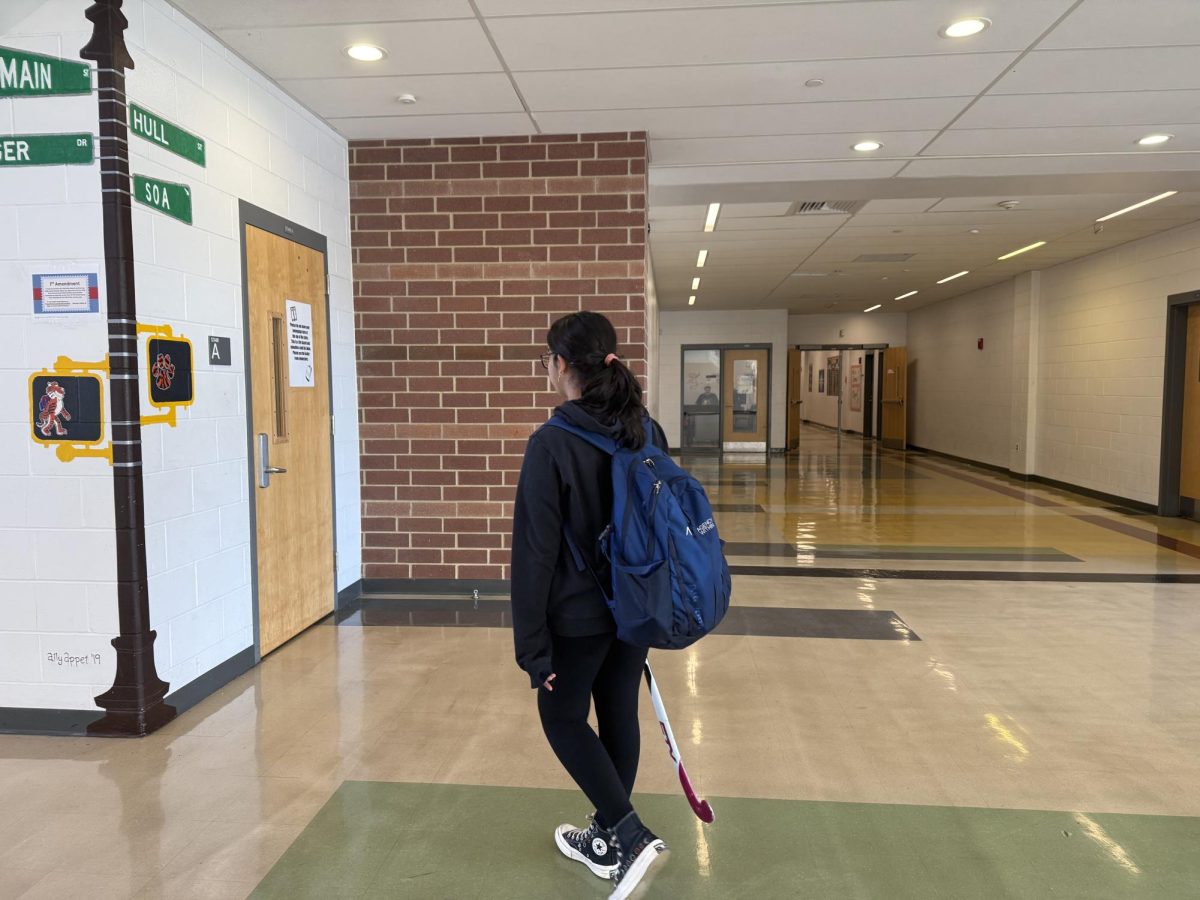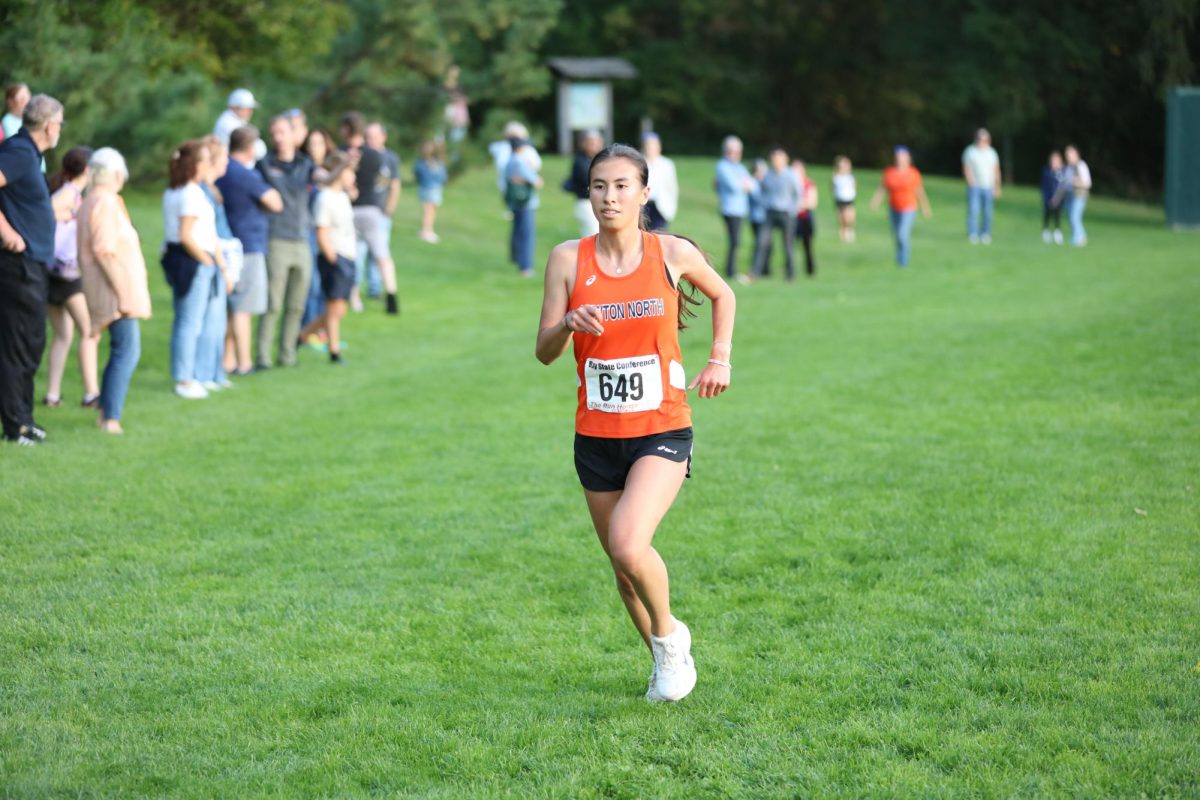 [/media-credit]
[/media-credit]
- Orchestra students rehearse for Springfest during F-block.
by Leah Budson
Springfest is split into two parts with Springfest I Wednesday, April 11 and Springfest II Thursday, April 12. Both performances are at 7 p.m. in the auditorium.
Springfest I will feature Concert Choir, Jubilee Singers, Symphonic Band and Wind Ensemble. During Springfest II, String Ensemble, Family Singers and Orchestra will perform.
Springfest I
Springfest I will feature Concert Choir, directed by Young, which will sing three pieces.
The group will sing “Hallelujah,” music by Leonard Cohen, arranged by Deke Sharon.
“A month or so ago I asked for some suggestions from Concert Choir, and a number of kids had mentioned ‘Hallelujah,’ so I found a nice four-part arrangement,” said Young. “It’s fun when the students get to pick their own tune.”
The choir will also sing “Set Me As a Seal” by René Clausen, a serious but beautiful piece, according to Young.
“If I Fell” by the Beatles will be Concert Choir’s third piece.
Both “Hallelujah” and “Set Me As a Seal” will be sung a cappella, “which has its own challenge, because there’s no harmonic support,” said Young.
“All three tunes are on the mellow side, but I think in their seriousness, they also have a real sense of uplift,” he said.
Performing after Concert Choir will be the Jubilee Singers, directed by Sheldon Reid.
Jubilee’s songs will include a spiritual tilted “I Hear a Voice A-Praying” by Houston Bright.
“I like the piece because it’s high in energy,” said Reid. “It is one of several spirituals in which the bass section is a focal point. You can’t do that unless you have a strong bass section, and this year we do.”
Also in Wednesday’s concert will be the Symphonic Band and the Wind Ensemble.
Richard Labedz, the director of both groups, explained that he “usually likes to do some traditional literature and then a more lyrical piece of some sort.”
Based on that idea, each group will perform one more traditional piece and one number more challenging on levels of musicality and expression, according to Labedz.
Symphonic Band’s more traditional piece will be “Americans We” by James Henry Fillmore, “a faster piece with some difficult woodwind runs,” according to Labedz.
Written by one of the major composers of marches, the piece is a staple for concert bands or even marching bands, said Labedz.
The Symphonic Band will also play “Pavane” by Gabriel Fauré. “It is kind of the opposite of ‘Americans We.’ It is a very lyrical piece, about balance and blending the different sections,” Labedz said.
The Wind Ensemble’s piece “March and Procession of Bacchus,” composed by Leo Delibes, is akin to “Americans We” in its more traditional approach.
“The march is kind of what you think about when you think of bands,” Labedz explained.
The Wind Ensemble will also play “Ye Banks and Braes O’Bonnie Doch” by Percy Grainger.
Labedz said, “The piece is very short, very lyrical and very similar to the ‘Pavane’ idea–there’s nothing technically difficult. Instead it’s more of a musicality thing, as it’s an extremely expressive piece.”
In addition, the Wind Ensemble will play “Variations of an African Hymnsong” by Quincy Hilliard.
Because of the African rhythms, the piece is unique, according to Labedz. “I tried to explore something completely different.”
Springfest II
Every year, Springfest features a Concerto Competition, which is “the thing that sets Springfest apart,” according to Young. Selected students have the opportunity to solo in a piece of their choice with one of the music ensembles.
In order to be chosen to participate in the Concerto Competition, seniors and juniors auditioned before the music department teachers. Auditions took place prior to February vacation according to Adam Grossman, the director of the Orchestra, Honors String Ensemble and Family Singers.
Four seniors were accepted to this year’s competition. Laura Cooke on cello, Joy Kang on violin and Nellie Robinson on viola will perform with the Orchestra. Emily Schacter will solo on flute with the String Ensemble.
The Orchestra, performing at Springfest II, will only play the concertos. “The competition is about featuring students,” Grossman said, “It’s something we’ve done for a long time.”
In to playing Schacter’s concerto, the String Ensemble will play “Overture for Strings” by Gordon Jacob. Composed in England during the 20th century, the overture “is pretty difficult, but it’s a piece that is well suited for the group we have,” said Grossman.
Family Singers will perform with the String Ensemble in a piece written in Latin by Wolfgang Amadeus Mozart titled “Regina Coeli.”
Grossman said, “It’s nice for the two groups to do something together. It gives us a chance to put instruments and voices together.”
Family Singers will sing a second piece in a foreign language, “Der Erste Frühlingstag” by Felix Mendelssohn-Bartholdy. The song’s title translates from German to English as “The First Day of Spring.”
The chorus will also sing “The Bees” by Rodney Lister, a contemporary piece that has been publicly performed only once before, according to Grossman. Lister, who previously taught at this school and currently teaches at Boston University and at the New England Conservatory of Music, will attend the concert.
“We’re singing three different pieces in three different languages from three different time periods,” said Grossman.
Whether through the mosaic of time periods and languages that define Family Singer’s numbers or through the technical and musical challenges in the pieces of the Symphonic Band and Wind Ensemble, Springfest is truly categorized by the diversity of its music.







































